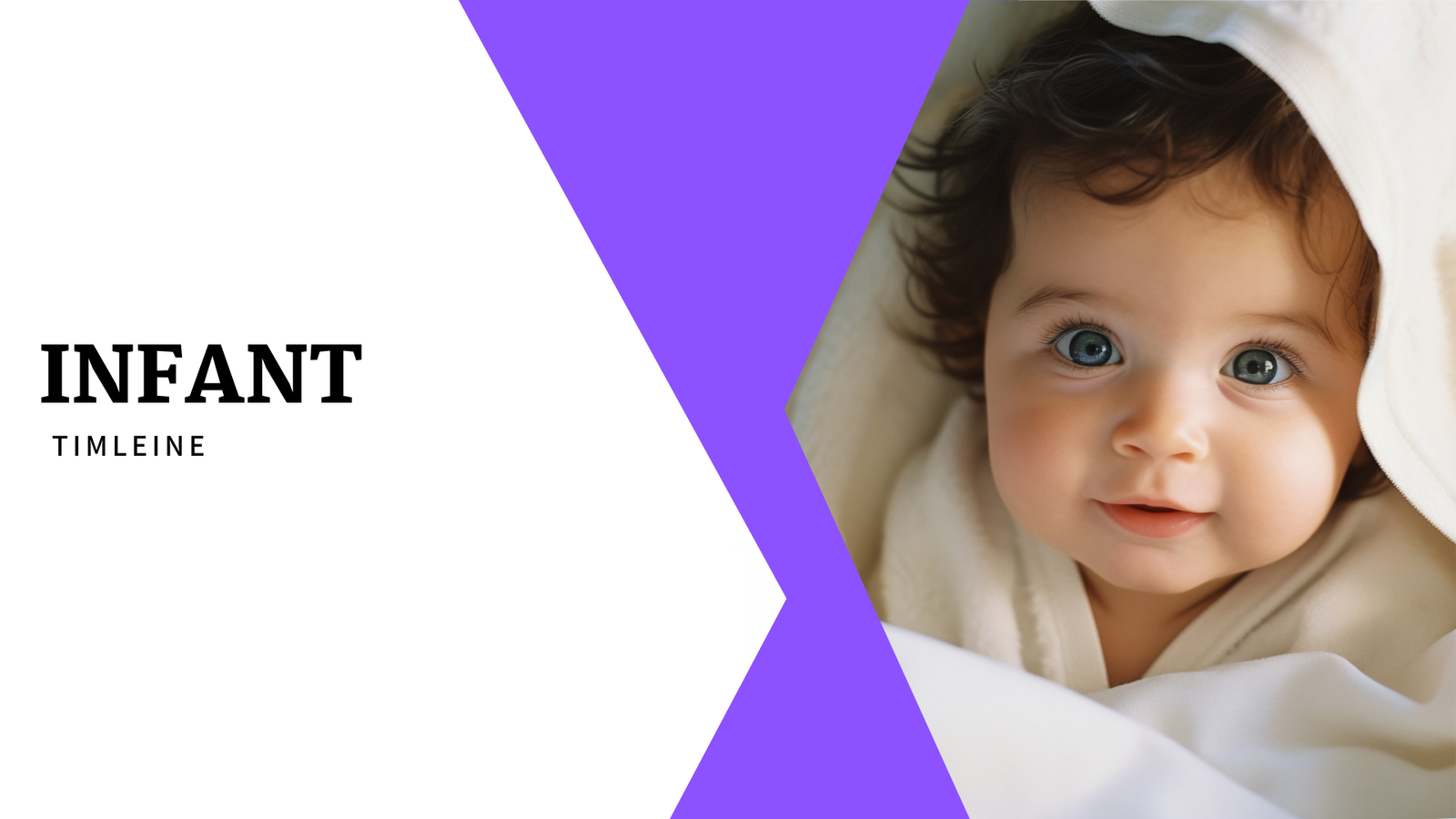The first year of your baby’s life is an incredible journey marked by rapid growth, new experiences, and numerous milestones. From your baby’s first smile to their first steps, every stage brings something magical and meaningful.
Understanding your baby’s Infant Timeline helps you recognize developmental changes and celebrate progress with confidence.
Whether you’re a first-time parent or already experienced, this guide breaks down what to expect each month.
Before that, please enter the details to get a free growth timeline for infants.
Baby Development: One to Three Months
In the first three months, your newborn begins adjusting to life outside the womb. Their senses awaken, and they start responding to the world around them.
Key Milestones:
- Physical Development: Babies begin to lift their heads briefly during tummy time. Their neck muscles strengthen, and reflexes like grasping and sucking become more coordinated.
- Cognitive Development: By the end of three months, babies start to recognize familiar faces and respond to sounds.
- Social & Emotional Growth: You’ll notice the first smiles — a huge emotional milestone for both parent and baby.
Parent Tips:
- Encourage tummy time daily to build motor skills.
- Talk and sing to your baby — your voice is comforting and aids language development.
- Capture these tiny moments using a milestone tracker in apps like KidsCur, so you can see how each day contributes to overall growth.
Baby Development: Four to Six Months
By now, your little one is more alert, expressive, and interactive. This phase marks the beginning of intentional movement and exploration.
Key Milestones:
- Motor Skills: Babies start rolling over, reaching for objects, and even sitting with support.
- Communication: Expect giggles, babbling, and mimicry as your baby experiments with sounds.
- Sensory Development: Improved vision helps them track moving objects and recognize caregivers from a distance.
Parent Tips:
- Offer toys with different textures to stimulate sensory exploration.
- Encourage safe floor play to help them strengthen muscles for crawling.
- Track each milestone using the Infant Timeline feature in KidsCur to ensure your child’s progress aligns with their age range.
Baby Development: Seven to Nine Months
This is the stage of curiosity and exploration. Babies start moving independently, making discoveries through touch, sound, and taste.
Key Milestones:
- Physical Growth: Most babies begin to crawl, sit unassisted, and pull themselves up.
- Fine Motor Skills: They can now grasp small objects between their thumb and forefinger — known as the “pincer grasp.”
- Cognitive Development: Memory improves, and babies recognize familiar voices and routines.
- Social Skills: They enjoy playing peekaboo and may feel anxious around strangers.
Parent Tips:
- Create a safe environment for crawling and exploration.
- Read picture books and name objects to build early vocabulary.
- Use a parenting app to record developmental milestones, feeding schedules, and sleep patterns.
Baby Development: 10 to 12 Months
The last quarter of the first year is exciting — your baby’s personality begins to shine, and major milestones unfold one after another.
Key Milestones:
- Walking & Movement: Some babies may start taking their first steps around 12 months, while others prefer crawling a bit longer — both are perfectly normal.
- Speech Development: Expect your baby to say “mama” or “dada” and understand simple instructions like “no” or “come here.”
- Cognitive Growth: Babies love imitation — from waving goodbye to clapping hands. They start showing preferences for people and toys.
Parent Tips:
- Encourage safe walking with push toys or sturdy furniture.
- Introduce finger foods to promote independence in eating.
- Celebrate your child’s milestones by logging them in KidsCur, ensuring you never miss a special moment in your baby’s Infant Timeline.
Timeline Table: Baby’s First-Year Development Overview
| Age (Months) | Development Highlights |
|---|---|
| 0–3 Months | Lifts head, smiles, tracks faces, coos |
| 4–6 Months | Rolls over, babbles, grasps toys, recognizes parents |
| 7–9 Months | Crawls, sits alone, plays peekaboo, shows emotions |
| 10–12 Months | Stands or walks, says first words, waves, claps hands |
This timeline offers a general overview — remember that every child develops at their own pace.
Your Baby’s Development: When to Talk to a Pediatrician?
While it’s natural for babies to develop at slightly different rates, there are signs that parents should watch for. Talk to your pediatrician if your baby:
- Isn’t making eye contact by three months
- Has trouble holding their head steady after four months
- Isn’t rolling over or sitting up by six to seven months
- Doesn’t respond to sounds or their name by nine months
- Can’t stand with support or babble by twelve months
Early consultation ensures that any developmental delays are addressed with proper care and guidance.
By using a parenting app, parents can monitor milestones closely and share accurate data with pediatricians during visits. This makes early detection and intervention more efficient.
RELATED: How to Choose The Right New Born Pediatrician?
Simplify parenting with our app.
Click on This Link

How KidsCur Helps Track the Infant Timeline?
Managing your baby’s health and development manually can feel overwhelming. That’s where KidsCur steps in — a modern parenting app built to simplify every aspect of your child’s growth journey.
Here’s how KidsCur supports you:
- Smart Development Tracker: Log milestones and get personalized reminders based on your baby’s age.
- Vaccination Scheduler: Stay on top of immunization dates and get timely alerts.
- Health Records in One Place: Store growth charts, prescriptions, and pediatric visits digitally.
- Parent-Centric Design: Easy to use, accessible anytime, and built with care — for parents, by parents.
With KidsCur, you can move beyond paper records and embrace smarter parenting. Each milestone, appointment, and health update is just a tap away.
FAQs
What is an Infant Timeline?
An Infant Timeline is a month-by-month overview of a baby’s physical, emotional, and cognitive milestones during their first year. It helps parents understand what to expect and how to support development.
How can I track my baby’s milestones effectively?
You can use digital tools that allow you to record milestones, monitor vaccinations, and maintain health records securely in one place.
When should I worry about developmental delays?
If your baby consistently misses milestones — such as not sitting up, babbling, or making eye contact — it’s best to consult your pediatrician for guidance and assessment.

